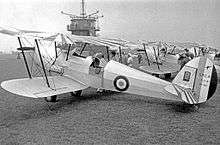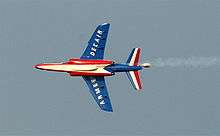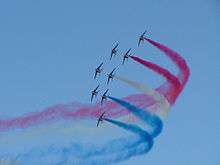Patrouille de France
| Patrouille de France | |
|---|---|
|
The Patrouille de France in full formation in 2011 | |
| Active | 1931–present |
| Country |
|
| Branch |
|
| Role | Aerobatic flight display team |
| Size |
8–9 Pilots 35 Support members |
| Base |
Base aérienne 701 Salon-de-Provence Salon-de-Provence, Bouches-du-Rhône, France 1964– |
| Nickname(s) | La PAF |
| Colors | Blue, White and Red |
| Aircraft flown | |
| Trainer |
1953–1954 Republic F-84 1954–1957 Dassault Ouragan 1957–1964 Dassault Mystère IV 1964–1981 Fouga Magister 1981–present Alpha-Jet |
The Patrouille Acrobatique de France (French pronunciation: [patʁuj akʁɔbatik də fʁɑ̃s], French Acrobatic Patrol), also known as the Patrouille de France or PAF, is the precision aerobatic demonstration team of the French Air Force. Originating in 1931, it is the world's oldest and one of the most skilled demonstration teams.[1] Pilots currently fly the Dassault/Dornier Alpha Jet.
History
In 1931 France's first aerobatic demonstration took place over Étampes-Mondésir. It was performed by the instructors from the local flying school with Morane-Saulnier MS-230 planes. In the period 1932-1939, under the command of Captain Pierre Fleurquin, the team received considerable praise and was chosen to represent France at international events.
Over in Dijon the "Weiser" team, consisting of 18 planes (Morane-Saulnier MS-225 and SPAD 510) gained fame for their team displays in which the planes were tied together.
The Patrouille d'Étampes team relocated to Salon-de-Provence in 1937, adopting the name Patrouille de l'École de l'air ("Flying school Patrol"). The Second World War interrupted the operations of both teams.

In 1947, the Minister for the Air created an aerobatic team from the Air Force. Led by Captain Perrier, a former pilot from the Patrouille d'Étampes team, it initially consisted of twelve Stampe SV.4 aircraft. Following the increasing popularity of their performances, a number of similar units were formed within the Air Force. In 1952, Squadron Leader Delachenal, a pilot from the 3rd combat division stationed at the airbase at Reims-Champagne, formed a team of four F-84 aircraft. In 1953, during an aerial event at Maison Blanche in Algeria, the show's commentator, carried away by the spectacle he had just witnessed, gave the team the name "Patrouille de France".
Over the following decade four separate aerial display Air Force units (12th unit – Cambrai-Épinoy; 4th unit Bremgarten; 2nd unit – Dijon-Longvic; 7th unit – Nancy-Ochey) continued to perform at both national and international events. In 1964 however, budget cuts led to reductions throughout the Air Force, including the dissolution of the Dassault Mystère IV team. Nonetheless, a few months later, keen that the Patrouille de France name should not be lost, the Ministry of Defence decided to create an official "Patrouille de l'École de l'air". Its team of six Fouga Magister aircraft stationed once again at Salon-de-Provence and became France's premier aerial display team for the next 16 years.
The final display involving the Fouga Magister, now nine in number, took place on September 16, 1980 at their home base of Salon-de-Provence. They were replaced by seven Alpha Jet, with an additional plane added in 1982. The aircraft, under the leadership of Squadron Leader Bernard Inge, has remained unchanged to this day.
In 1986, the team took part in an historic fly-past above New York City.
In 2009, the Patrouille de France achieved a world premiere when Commandant Virginie Guyot was appointed leader, becoming the first woman in history to lead a demonstration team.
If you look at the Google Earth photo image for Bergerac Airport currently (spring 2014) the entire team (Alphajets and Transall support) can be seen drawn up on the ramp at the far west of the airport buildings. Photo location
Aircraft
.jpg)
- Republic F-84 G Thunderjet (1953–1954)
- Dassault Ouragan (1954–1957)
- Dassault Mystère IV (1957–1964)
- Fouga Magister (1964–1981)
- Dassault-Breguet/Dornier Alpha Jet (since 1981)
Each aircraft is painted blue-white-red, with the gun placement replaced with a smoke generator. Search lights are installed on the aircraft nose, and the viewfinder has been removed to improve visibility.
Incidents
- 1967 – A Fouga flown by the deputy leader, Capt. Didier Duthois, failed to pull out and pancaked after the final downward bomb-burst on the last day of the Le Bourget Air Show. The pilot was killed.
- 1980 – Two Fougas collide while performing a synchronized inverted maneuver off-base. Both pilots were killed.
- 1981 – An Alphajet flown by the commander of the EPAA crashes north of Aix en Provence. The Pilot did not eject and was killed.
- 1982 – Athos 8 (opposite solo) crashes while rehearsing the display at Salon Air Base.
- 1983 – Two aircraft collided while performing 4 vs 4 crossover maneuver at an airshow in Niort, France. Both pilots ejected, however one of them, Lt Vuillamy, suffered fatal injuries.
- 1987 – The two solos collided during the Annemasse Airshow, none of the pilots were injured.
- 1991 – The two solos collided during practice over water, one pilot was killed, the other ejected and only suffered minor injuries.
- 1992 – The opposite solo crashes during a training flight at Salon Air base, the pilot narrowly avoided a major expressway but activated his ejection seat too late and was killed.
- 2010 – An Alpha Jet E crashed near Plan de Dieu Airport (LF51), Vaucluse area, France. The pilot ejected and escaped with minor injuries.
Gallery





.jpg)

 Patrouille de France at RIAT 2004
Patrouille de France at RIAT 2004 Patrouille de France at RIAT 2004
Patrouille de France at RIAT 2004 Patrouille de France at RIAT 2004
Patrouille de France at RIAT 2004 Patrouille de France at RIAT 2004
Patrouille de France at RIAT 2004 Patrouille de France at RIAT 2004
Patrouille de France at RIAT 2004 Patrouille de France over Ploumanac'h 2010
Patrouille de France over Ploumanac'h 2010
References
- ↑ Charles Bremner – Times Online – WBLG: French pilots show women can fly Archived April 7, 2008, at the Wayback Machine.
External links
| Wikimedia Commons has media related to Patrouille de France. |
- (French) Official website
- (English) People's Daily article about the Patrouille performances in China (2004)
- (English) The Patrouille de France crash